- Home
- Kahlil Gibran
The Treasured Writings of Kahlil Gibran
The Treasured Writings of Kahlil Gibran Read online
A Treasury of Kahlil Gibran
Kahlil Gibran
Edited by Martin L. Wolf
Translated from Arabic by
Anthony Rizcallah Ferris
Philosophical Library
EDITOR’S PREFACE
THE IMMORTAL WRITINGS of Kahlil Gibran, the Prophet of Lebanon, possess a rare and distinctive flavor of ancient wisdom and mysticism that is equaled by few—if any—in the history of world literature. Small wonder, then, that the reader never ceases to be amazed at Gibran’s recency to this world and age (1883–1931). The delicacy of his mind, the visions of his inner eyes, and the vast but simple insight displayed by his every parable combine to present a momentary incongruity. It is quickly dispelled, however, for one soon realizes that Gibran is of all ages.
The brilliance of Gibran will ever continue to surprise and perplex his millions of followers in dozens of languages. This strange man, born in the shadow of the Holy Cedars of Lebanon, exhibits a weirdly beautiful approach to life and death in all of his writings, never fully revealing the purpose behind his abrupt and intense changes in thought and style … from the laciest and tenderest language and meaning to the bitterest and angriest outpourings known to literature. After an attempted analysis that ended in utter despair, a group of scholars at a leading American university could only conclude, Gibran could write timeless truths in a way that makes the reader feel he is taking a walk in a quiet wood, or bathing in a cool stream; it soothes the spirit. But he could also write with a scorch like fire. The tremendous “why” could not be found.
Philosopher and artist, his dynamic brush is no less disturbing than his pen. The searching depths of mysticism, the unfettered glory of youth, and the Elysian beauty of death join forces to render his canvases remarkably fascinating and unique. As for his handling of materials and his artistry of representation, all that need be said is that when Auguste Rodin wished to have his own portrait done, he bypassed the multitude of accomplished and aspiring painters of his day and insisted that Gibran execute the project. Hundreds of Gibran’s oil paintings are on permanent exhibit in a Lebanese museum erected solely as the repository for these works, and numerous of his paintings and drawings are displayed periodically in the large capitals and art centers of the world.
Gibran has a specific, recognizable message to convey, and the simplicity of his style—whether in delicacy or in bitter invective—brings that message to the inner consciousness of the reader quickly, clearly, and effortlessly. A surprising aspect of many of the writings in this, the largest and most comprehensive volume of Gibran’s works ever published, is found in the fact that he was scarcely twenty years old when they were composed and set loose upon the world. In the light of his youth, these works establish unquestioned achievement in literary and philosophic artistry, since they would have been classics coming even at an age of experienced wisdom and mellowness of years. There is broad vision and justifiable anger with respect to religious injustice in John the Madman (Book Two); exquisite beauty of thought and language in his series of Seven Songs (Books One, Three, Four, Five, Six); enormous maturity of understanding in The Life of Love (Book One) and Madame Rose Hanie (Book Five); keen invention of plot and element of surprise in Satan (Book One), one of the few truly original and different forms of literary development to appear in many years; tear-enriched distress in The City of the Dead (Book One) and Contemplations in Sadness (Book Six); mystical strength surpassing William Blake in Ashes of the Ages and Eternal Fire (Book Four); heartfelt pain and bitterness in The Crucified (Book Three).
That Gibran earnestly feels the genuineness of the message he endeavors to carry to the reader is shown in many of his passages, as in the closing words of A Poet’s Voice (Book One), in which he proclaims: What I say now with one heart will be said tomorrow with many hearts. These profound broodings and exaltations in prose and poetry are of particular timeliness in contemplation of the difficulties besetting the world today, and much can be gleaned therefrom in furtherance of tolerance, understanding, and the universal brotherhood of man. His warnings are neither crusades nor preachments, yet every thought is conveyed completely, clearly, dynamically. He muses over the beautiful, not the ugly; over the system, not the crime (The Criminal, Book Three). All of his criticisms are imbued with a gentle melancholy, subordinated finally to his magnificent descriptive powers, abounding with fine, metaphorical terseness.
Reference has been made to Gibran’s youth at the time of these writings, and this factor cannot be regarded lightly, for it renders all the more remarkable his ripe and mature grasp on a subject that has baffled and intrigued philosophers and other thinkers from the beginning—the destiny of man and the inexplicable why of his being. Likewise, his unquestioned mastery of the art of symbolism and simile, sparkling throughout this extensive collection of his writings, is a tribute to his astonishing stature in literary accomplishment, for this is an achievement that few have been able to attain at any age. His sympathetic approach to the prospect of death is also a creature of the mind belonging to the aged, but a knowledge of Gibran’s love for tears, as well as his deep, sincere affection for fellow sufferers, can explain his philosophically pleasant contemplations of death. Numerous instances reveal his full understanding of the facts of maturity and stability in connection with marriage, despite his years. In The Life of Love (Book One), a poem likening the four seasons of the year to the comparable periods of married life, the aging couple exchanges reminiscences in winter time, the husband sighing affectionately:
Feed the lamp with oil and let it not dim, and
Place it by you, so I can read with tears what
Your life with me has written upon your face.
Bring Autumn’s wine. Let us drink and sing the
Song of remembrance to Spring’s carefree sowing,
And Summer’s watchful tending, and Autumn’s
Reward in harvest.
Come close to me, oh beloved of my soul; the
Fire is cooling and fleeing under the ashes.
Embrace me, for I feel loneliness; the lamp is
Dim, and the wine which we pressed is closing
Our eyes. Let us look upon each other before
They are shut.
Surprisingly, the mysticism that characterizes much of Gibran’s writing is found not in his poetry, where it would be granted a great latitude of expression through the very nature of poetic freedom, but in his prose stories exclusively. This feature of his works is not a deterrent to reader interest, for his depth establishes itself at a level of complete lucidity to all who endeavor to find it, and his frequent voyages into the field of mysticism supplement with spiritual argument the precepts of his earthly discourses. His blending of oriental and occidental philosophy is occasionally disconcerting to the Western mind. One invariably has the feeling that the emotions expressed so plainly were too large for words, and were wrenched from him reluctantly through his soul’s compulsion. One cannot fail to recognize in him the strong expression of a passionate urge to improve the lot of suffering, exploited humanity, an impulse that fired his mind and heart from childhood. It is a message, moreover, that emanates from painful, soul-searing knowledge of man’s inhumanity to man, drawn from a poignant memory of what his eyes had seen and his ears had heard in his close observance of the perpetual human tragedy. He conveys his sense of sorrow for the cruel waste of youth and beauty and talent and sensitivity implicit in the neglect and degradation of the millions throughout the East.
But far more than local evils and the abuse of power by Eastern regimes is woven into the living fabric of Gibran’s verbal tapestry. With the moving intensity that characterizes t
ruly significant utterance, his earliest—like his latest—writings project timeless, universal truths. And these are often presented in the captivating literary form of the parable, peculiarly a heritage of the ancient Aramaic tradition.
His sentiments herein give new force to his other great works, for all possess the power and effectiveness of his one enormous theme. They stress the generally understood, yet completely ignored fact that but few things in life have real importance. Again and again this Lebanese savant reminds us that if human relationships are wrong, no other factors of life can really matter. For what power, or wealth, or prestige can compensate for the silent agony of the heart’s bereavement? In what fashion can existence on earth be fulfilled when love departs or friendship withers? The bonds of a common brotherhood without demarcation, no less than personal and family ties, must be strengthened if, individually and collectively, we are to meet competently the challenge of progress—or even of survival itself.
Gibran drives these teachings forcefully to the heart, and they persist in agitating the heart to complete accord. Like Beethoven’s deathless music, of which the composer said, “From the heart it has sprung, and to the heart it shall penetrate,” these writings, through their own rich sincerity, reach the deepest recesses of our emotional and spiritual awareness.
Among the outstanding pieces in this volume is the strangely gripping story The Bride’s Bed (Book Seven), actually an eye-witness account of the incident related. Its theme is not new to the great number of readers and students of Gibran, for the vicious inequality of man and woman had long been the object of his strongest literary attacks.* One of the world’s most fervent and outspoken champions of the cause of human rights, Gibran had waged a long and bitter struggle to strengthen the recognition of youth’s freedom of action in love, and to abolish from the social structure of the Middle East some of the ancient marriage customs prevailing. Particularly intense was his condemnation of the tradition of prearranged marriages of children by their parents, in complete disregard of the wishes and reactions of those so betrothed. It is a matter of common knowledge that these transactions often took place when the children concerned were scarcely old enough to walk, much less realize the enormous significance of the steps then planned irrevocably for them.
The ill-fated Lyla in this story, with courageous, anguished heroism, broke in unrestrained fury from this custom, bringing upon herself—fully anticipated—consequences so tragic, so far-reaching as to establish beyond question the widespread, deep-rooted nature of this practice in all of its personal, social, political, and ironically enough, even religious ramifications. Examine, for instance, the words of the priest addressed to the throng gathered about the lifeless bodies of the bride and the man she had really loved:
Cursed are the hands that touch these blood-spattered carcasses that are soaked with sin. And cursed are the eyes that shed tears of sorrow upon these two evil souls. Let the corpse of the son of Sodom and that of the daughter of Gomorrah remain lying in this diseased spot until the beasts devour their flesh and the wind scatters their bones. Go back to your homes and flee from the pollution of these sinners! Disperse now, before the flames of hell sting you, and he who remains here shall be cursed and excommunicated from the church and shall never again enter the temple and join the Christians in offering prayers to God!
It is a story of truth, of bravery, of all humanity’s interest, going to the very core of individual liberty. It is recognized conclusively by authorities the world over that Gibran, through the knife-edged attacks of this story and others,* was largely responsible for many of the social, political and religious reforms finally undertaken by the rulers of the East.
Gibran’s doctrine is of kindness, of brotherhood, and of charity and he requires but few words to transmit great thoughts. On charity he discloses:
I sing the praise of my home and long to see again my birthplace but if it refused shelter and food to the needy wayfarer, I would, in my inner voice, convert my praise into anger, and my longing into forgetfulness.
And again:
Remember, my brother, that the coin which you drop into the withered hand stretching toward you is the only golden chain that binds your rich heart to the loving heart of God.
On brotherhood:
Love is stronger than death, and death is stronger than life; it is sad that men divide amongst themselves.
He adds:
Humanity is the spirit of the Supreme Being on earth, and humanity is standing amidst unseen ruins, hiding its nakedness behind tattered rags, shedding tears upon hollow cheeks, calling for its children in pitiful voice. But the children are busy singing the anthem; they are busy sharpening the swords and cannot hear the cries of their mothers.
Small wonder that the present world gives heed to Gibran in its acute difficulty! His thoughts are ageless, and the real, the essential Gibran will live on and grow through the centuries.
On a level with Gibran’s desire to bring to the world his strong but simple philosophy of life and death, was his burning ambition to revolutionize and give impetus to the previously neglected and unrecognized Arabic contribution to world literature. With his close friend and associate, Mikhail Naimy, he was instrumental in maintaining the journalistic endeavor known as Al-Funoon (The Arts), conceived and launched by Nasseeb Ariba. However, the years embracing World War I saw both its inception and demise, despite all efforts of its few supporters to see it through. Somewhat earlier, Gibran had enthusiastically created a literary enterprise which he had called The Seven Arts, essentially an organ of poetry. Although it, too, was but a short-lived proposition, it nevertheless served as the instrument which carried Gibran’s name to various art organizations, among them the important Poetry Society which invited him to read some of his works to its membership body at a special gathering. He emerged from the meeting with uncontrolled bitterness and resentment, for the literati had received him and his carefully prepared work with nothing short of unconcealed mockery.
He neither despaired nor relented, nor acknowledged defeat. On the contrary, he resorted to his pen—his closest friend in moments of travail—and composed his now famous prose-poem Defeat,* in which he converted his failure into a sword with which to avenge his assailants:
Defeat, my Defeat, my shining sword and shield,
In your eyes I have read
That to be enthroned is to be enslaved,
And to be understood is to be leveled down,
And to be grasped is but to reach one’s fulness
And like a ripe fruit to fall and be consumed.
Defeat, my Defeat, my deathless courage,
You and I shall laugh together with the storm,
And together we shall dig graves
For all that die in us,
And we shall stand in the sun with a will,
And we shall be dangerous.
This incident may have provoked (at least in part) the unorthodox writings that followed. In this broad segment of his literary creations he worships the poor, the meek, the downtrodden; he brings down heavens of wrath and invective upon exploiters, unsympathetic rulers, and grasping officials—political, ecclesiastical, and others. He adores simplicity; he deplores the complications growing alongside the “advances” of our civilization. He finds freshness and freedom in the field; * he discovers only stifling nothingness in the city streets. He gives his words and thoughts of beauty to the fellahin, to the ignorant, to the sad; he casts his unleashed vituperation upon those employing improper use of power and position.
The painful death-by-starvation of both The Seven Arts and Al-Funoon, and the threadbare struggle of the one remaining Arab voice in America, As-Sayeh (The Traveler), left burning all the stronger the desire—the desperate need—to establish an Arab-American publication which would close the abysmal gap between East and West through the great medium of literature.
On April 20, 1920, a serious group of ten writers of Arabic descent met at Gibran’s studio in New York,
and remained in almost endless session fostering the birth of what was to become Arrabitah (The Pen Bond). This weary but enthusiastic nucleus included Kahlil Gibran, Nasseeb Ariba, Rasheed Ayoub, William Catzelflis, Mikhail Naimy,* Abdul-Masseeh Haddad, Nadra Haddad, and Elias Atallah. Its purposes, according to the manuscript of the secretary’s notes made that night, were: (1) to publish the works of its own members and those of other Arab writers considered worthy, and to encourage the translation of masterpieces of world literature; (2) to foster new talent by offering prizes for the best in poetry and prose. (It might be added parenthetically that the only available “prize” was probably a subscription to the publication.)
As his preliminary contribution, Gibran painted an attractive emblem for Arrabitah (Arabic, Ar-Rabitatul Qalamyiat) representing a circle having an open book at its center. Across the pages appeared the quotation How wonderful the treasures beneath God’s throne which only poets’ tongues can unlock!—taken from the Hadith.*
The preamble to the by-laws stated, in part:
… Not everything parading as literature is literature; nor is every rimester a poet. The literature we esteem as worthy is that only which draws its nourishment from Life’s soil and light and air.… And the man of letters is he who is endowed with more than the average mortal’s share of sensitiveness and taste, and the power of estimation and penetration together with the talent of expressing clearly and loftily whatever imprints Life’s constant waves leave upon his soul.…
This new movement, aimed at transporting our literature from stagnation to life, from imitation to creation, is worthy of all encouragement; if left fallow, decay and disintegration will take hold.…
Gibran gave untiringly to Arrabitah from his two only resources … time and effort. He showered the publication with many works which were to become internationally known, including his highly controversial The Tempest (Book One).
Gibran’s feeling for his homeland and his countrymen remained strong despite such of his writings as Dead are my People (Book Seven), and despite the public burning of his Spirits Rebellious in the market place of Beirut, his subsequent excommunication from the church, and his exile from the country. The two specific works in Spirits Rebellious which appear to have precipitated the drastic official measures are Cry of the Graves (Book Seven) and Khalil the Heretic (Book Six), both of which condemned in previously unheard language the evils of church and state administration prevailing at the turn of the twentieth century.

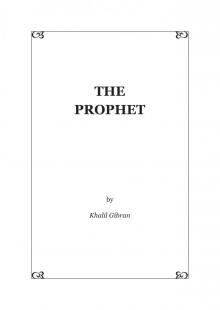 The Prophet
The Prophet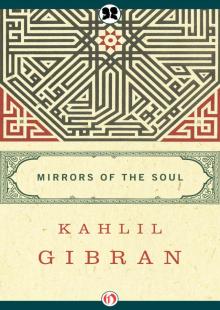 Mirrors of the Soul
Mirrors of the Soul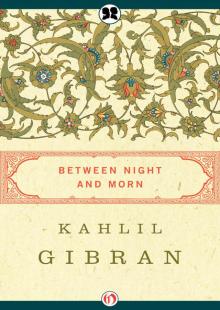 Between Night and Morn
Between Night and Morn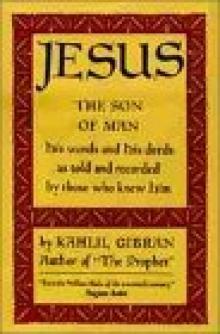 Jesus the Son of Man
Jesus the Son of Man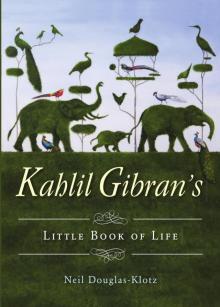 The Little Book of Life's Wisdom
The Little Book of Life's Wisdom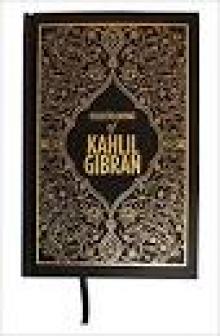 The Kahlil Gibran Collection
The Kahlil Gibran Collection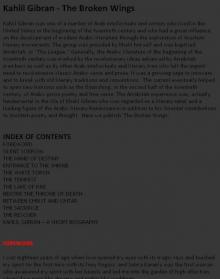 The Broken Wings
The Broken Wings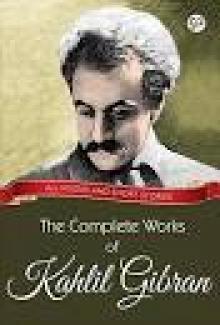 Collected Poetical Works of Kahlil Gibran
Collected Poetical Works of Kahlil Gibran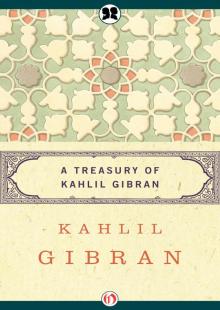 The Treasured Writings of Kahlil Gibran
The Treasured Writings of Kahlil Gibran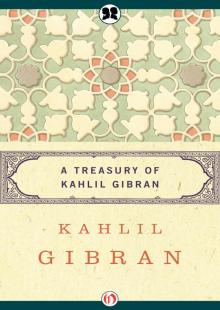 Treasury of Kahlil Gibran
Treasury of Kahlil Gibran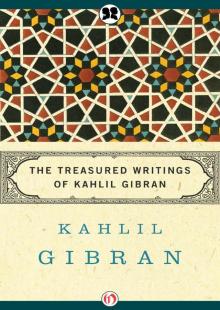 Treasured Writings of Kahlil Gibran
Treasured Writings of Kahlil Gibran